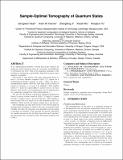Sample-optimal tomography of quantum states
Author(s)
Ji, Zhengfeng; Yu, Nengkun; Haah, Jeongwan; Wu, Xiaodi; Harrow, Aram W.
Downloadtomo-stoc-proceeding.pdf (368.9Kb)
OPEN_ACCESS_POLICY
Open Access Policy
Creative Commons Attribution-Noncommercial-Share Alike
Terms of use
Metadata
Show full item recordAbstract
It is a fundamental problem to decide how many copies of an unknown mixed quantum state are necessary and sufficient to determine the state. This is the quantum analogue of the problem of estimating a probability distribution given some number of samples.
Previously, it was known only that estimating states to error є in trace distance required O(dr2/є2) copies for a d-dimensional density matrix of rank r. Here, we give a measurement scheme (POVM) that uses O( (dr/ δ ) ln(d/δ) ) copies to estimate ρ to error δ in infidelity. This implies O( (dr / є2)· ln(d/є) ) copies suffice to achieve error є in trace distance. For fixed d, our measurement can be implemented on a quantum computer in time polynomial in n. We also use the Holevo bound from quantum information theory to prove a lower bound of Ω(dr/є2)/ log(d/rє) copies needed to achieve error є in trace distance. This implies a lower bound Ω(dr/δ)/log(d/rδ) for the estimation error δ in infidelity. These match our upper bounds up to log factors. Our techniques can also show an Ω(r2d/δ) lower bound for measurement strategies in which each copy is measured individually and then the outcomes are classically post-processed to produce an estimate. This matches the known achievability results and proves for the first time that such “product” measurements have asymptotically suboptimal scaling with d and r.
Date issued
2016-06Department
Massachusetts Institute of Technology. Center for Theoretical Physics; Massachusetts Institute of Technology. Department of Mathematics; Massachusetts Institute of Technology. Department of Physics; Massachusetts Institute of Technology. Laboratory for Nuclear ScienceJournal
Proceedings of the 48th Annual ACM SIGACT Symposium on Theory of Computing - STOC 2016
Publisher
Association for Computing Machinery
Citation
Haah, Jeongwan, Aram W. Harrow, Zhengfeng Ji, Xiaodi Wu, and Nengkun Yu. “Sample-Optimal Tomography of Quantum States.” Proceedings of the 48th Annual ACM SIGACT Symposium on Theory of Computing - STOC 2016 (2016).
Version: Author's final manuscript
ISBN
9781450341325